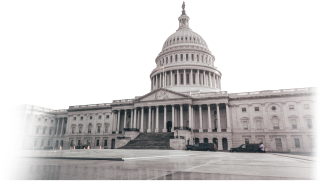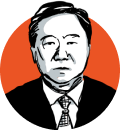China's evolving perception of the United States' international influence and domestic resiliency has been an important component in how Beijing assesses the international balance of power and its own opportunities to shape—or challenge—the global order. Since the Global Financial Crisis in 2007–2008, Beijing has assessed that the United States is experiencing a slow but steady deterioration of its national power and international influence.
Events of the past 12 months have consolidated this consensus.
But is Beijing's perception of declining U.S. influence and power accurate? And is this narrative setting up the Xi Jinping administration to make strategic miscalculations by overestimating its own relative power? In this open-source analysis, Jude Blanchette, the Freeman Chair in China Studies, and Seth G. Jones, director of the International Security Program, explore the implications for the United States from Beijing's growing perception of U.S. decline.
Beijing’s New Narrative of U.S. Decline
The implications for the United States from Beijing's strengthening assessment of American decline.
- Published on

On January 6, 2021, hundreds of Trump supporters stormed the U.S. Capitol Building in a failed attempt to halt the certification of the presidential election by Congress. The shocking footage of the violence and unrest, which dominated U.S. media for the next several months and triggered an intense Congressional debate about establishing a January 6 commission, was also heavily covered by foreign media outlets.
Chinese state media, including its flagship nightly news program, Xinwen Liangbo, devoted substantial coverage to the unrest. While this segment avoided exaggeration and stuck mainly to the basic facts, the striking visuals of rioters walking the halls of the Capitol Building largely unmolested made the point Beijing was intending—American democracy is unstable, chaotic, and violent.
Since the founding of the People's Republic of China in 1949, China's leaders have looked at the United States with a complex and shifting mixture of fear, admiration, and hostility. During the Cold War, especially during the leadership of Mao Zedong, Beijing saw the United States as the leader of the global "imperialist forces," and warned of U.S. efforts to destabilize China's domestic political and economic system via "peaceful evolution." Yet just as Beijing viewed the United States as a potent threat, it also diagnosed what it believed to be structural and inherent weaknesses in American society stemming from its capitalist system. Thus, the United States was both strong and weak, according to Beijing. This view was famously summed up by Mao Zedong, who, in remarks given in 1956, argued,
"At present, the United States is powerful, but when looked at in a broader perspective, as a whole and from a long-term viewpoint, it has no popular support, its policies are disliked by the people, because it oppresses and exploits them. For this reason, the tiger is doomed."
- Mao Zedong
As ties between the two countries strengthened beginning in the early 1970s, the sharpness of Beijing's public rhetoric on U.S. leadership and power moderated, but the sub rosa discourse stressing the inevitability of U.S. instability and decline remained.
The Global Financial Crisis in 2007–2008 was an inflection point, with a pronounced consolidation of the "capitalist instability" narrative in policymaking and intellectual circles. At the same time, it gave rise to the view that China's own domestic institutional and political system possessed significant advantages relative to Western democracy. The period after the financial crisis saw an explosion of Chinese-language articles extolling the "superiority of the Chinese system" as well as diagnosing the deterioration and atrophy of U.S. financial power and governance competency. This translated into an increasingly confident China on the global stage. "China is a big country and other countries are small countries, and that's just a fact," a senior Chinese diplomat lectured Singapore's foreign minister in 2010.
Beijing's American Narrative
- The United States' democracy and its political system have stopped functioning.
- The United States' conception of "universal values" only maintained global appeal because they were backed by U.S. power. As U.S. strength wanes, so too will the values it promotes.
- The world is no longer looking to the United States for global leadership; the world is moving toward multipolarity; and the East is rising, the West is declining.
The past 12 months have seen another push of this dual narrative—of the "superiority" of China's authoritarian political and economic system coupled with an ongoing and accelerating decline of U.S. domestic competence and international influence. Contributing factors include the rising death toll and economic fallout from the Covid-19 virus and attempts by Donald Trump to deny the legitimacy of President Biden's election victory.
But is Beijing's diagnosis of American atrophy accurate? Does China's increasingly restrictive information environment permit narratives that challenge the status quo view of U.S. decline? Most importantly, if the decline narrative entrenches to become an unshakable political consensus, will Beijing overestimate its own strengths, understate U.S. resilience, and miscalculate in its assessment of—and dealings with—the United States?
To explore these questions, the CSIS Freeman Chair in China Studies and the International Security Program have translated a selection of publicly available materials that have appeared in authoritative venues.
The United States' democracy and its political system have stopped functioning.
'American Democracy' – The End of the Myth美式民主” 神话的终结
The United States has always portrayed itself as a "beacon of democracy," pretending to be a model of democracy in the world, fabricating countless myths about American democracy, and trying its best to sell and export it to other countries, even through the use of force.1 However, this violent attack on Congress has exposed the myth of "American democracy,"2 proving that the United States is not a democratic Garden of Eden. There are fundamental flaws to "American democracy."
Jump to this page in the PDFShow original text
美国一向自诩为"民主灯塔",把自己装扮成世界民主楷模,编造了无数美国民主的神话,极力向其他国家推销和输出,甚至不惜为此使用武力。然而,这次暴力冲击国会事件戳穿了"美式民主"的神话,证明美国并非民主的伊甸园。"美式民主"存在根本缺陷。
One of the myths of "American democracy" is that fierce conflicts and civil wars caused by power struggles can be avoided through elections so as to achieve the smooth transition of power… Now, this "American Democracy" that incited protesters to attack Congress and broadcast it live to the entire world proves that elections may not guarantee the peaceful transfer of political power.3
Jump to this page in the PDFShow original text
"美式民主"的神话之一是选举可以避免权力争夺造成的激烈冲突和内战,实现权力的平稳过渡... 现在,这场煽动抗议者冲击国会、向全世界公开播放的"美式民主"实景秀证明,选举未必能够保证政治权力的和平交接.
The poor performance of the U.S. government in the face of the Covid-19 pandemic proves once again that "American democracy" cannot bring about effective governance4. After the outbreak, some American politicians bore no responsibility for the lives of the people, ignored science, and did not take active measures to deal with the pandemic, allowing it to continue to spread, causing a major failure in pandemic prevention… The failure of pandemic prevention has stripped away the emperor's new clothes of the American democratic system and exposed the political and governance failures of the United States.
Jump to this page in the PDFShow original text
美国政府面对新冠肺炎疫情的种种拙劣表现,再次证明"美式民主"无法带来有效治理。疫情发生后,美国一些政客不为民众生命负责,无视科学,不采取积极措施应对疫情,任由疫情不断蔓延,造成防疫重大失败... 防疫失败剥开了美国民主制度的皇帝新衣,暴露了美国的政治失能和治理失灵.
The Deterioration of Western Politics Further Harms the World西方政治劣质化进一步贻害世界
The Western political camp produces more and more ideological viruses, public opinion gunpowder, and political garbage, causing waves of serious pollution to surge through the global political ecology. Some Western politicians who lack ethics and professional standards continue to lob inferior political products, worsening the environment for international exchanges and cooperation, interfering with the process of globalization, dragging down the development of economic and trade relations, and disrupting global production chains. What's more, this also artificially creates enemies and triggers international conflicts.
Jump to this page in the PDFShow original text
西方政治阵营生产越来越多的思想病毒、舆情火药和政治垃圾,给全球政治生态造成一波又一波的严重污染。一些缺少道德和专业水准的西方政客不断抛出劣质政治产品,恶化国际交往合作环境,干扰全球化进程,进而拖累经贸关系的发展,打乱全球产业链。更有甚者,还人为制造敌人,引发国际冲突。
Westerners, especially younger generations, have declining confidence and trust in Western-style democracy year by year, and American confidence in the democratic system has dropped to its lowest point in 20 years. American society has become more torn apart, money politics has distorted public opinion, elections have become a "one-man show" of tycoons and oligarchs, and racial discrimination and the politics of hate have intensified, impacting the very foundation of American politics. More and more scholars have even pointed out that the alienation and deterioration of Western-style democracy has intensified or that it may be submerged by populism or eroded by chauvinism, xenophobia, and fascism.
Jump to this page in the PDFShow original text
西方民众尤其青年一代对西式民主的信心与信任逐年下降,美国人对民主制度的信心更是下降至20年来最低点。美国社会撕裂加剧,金钱政治扭曲民意,选举成为财阀寡头的"独角戏",种族歧视、仇恨政治愈演愈烈,冲击着美国政治的根基。乃至越来越多的学者提出,西式民主异化变质加剧,或被民粹主义淹没,或被沙文主义、排外行为以及法西斯主义侵蚀。
Looking back at history, it is precisely because the United States and the West themselves wasted a period of historical opportunity that the world has traveled down such a dark path. The period from the late 1980s to the early 1990s marked the end of the Cold War. Marked by the fall of the Berlin Wall and the disintegration of the Soviet Union, the post-World War II confrontation between the West and the East, the capitalists and socialists, [between] NATO (led by the United States) and the Warsaw Pact (led by the Soviet Union) ended, and the world entered the "post-Cold War Era." After the collapse and destruction of the Soviet Union during the Cold War, the United States represented the West on the apex of the world, reaping trillions [of dollars] in "Cold War dividends." At the same time, however, the West seemed to be suffering from "political fanaticism"—on the one hand, it wanted to export democracy to the outside world in a vain attempt to dominate the world; on the other hand, they perceived conflicts and confrontations amongst different civilizations and religious cultures. As a result, the world was once again divided into two camps by Western politicians: Western hegemony, led by the United States, and the non-Western world of suppressed and sanctioned countries.
Jump to this page in the PDFShow original text
回望历史,又恰恰是美西方自己浪费了历史机遇期,几乎将世界带入邪路。20世纪80年代末到90年代初是冷战结束时期。以柏林墙倒塌、苏联解体为标志,二战后西方与东方阵营、资本主义与社会主义阵营、以美国为首的北约和以苏联为首的华约之间对抗结束,世界进入"冷战后时代"。在冷战中瓦解和摧毁苏联后,美国代表西方坐上世界金字塔的塔尖,收获数以万亿计的"冷战红利"。但同时,西方政治阵营仿佛患上了"政治狂想症":一面肆意对外输出民主,妄图独霸全球;一面又臆想不同文明和宗教文化的冲突与对抗。结果世界又一次被西方政客划分为两个阵营:以美国为首的西方霸权阵营和其他被打压、被制裁的非西方世界。
The United States' conception of "universal values" only maintained global appeal because they were backed by U.S. power. As U.S. strength wanes, so too will the values it promotes.
Behind the Political Chaos: The Decline of American Values政治乱象的背后:美式价值观的衰落
After World War II, the United States advocated and vigorously promoted a series of so-called universal values1, including democracy, freedom, and human rights. These values were regarded as the cornerstones of the global order dominated by the United States and the West. The collapse of the Soviet Union and the end of the Cold War marked a point at which the value system advertised by the United States reached its highest global momentum and even the so-called end of history emerged. However, history does not evolve in accordance with American visions and plans. Rather, it is only an illusion that all countries in the world embrace American values. The concepts of democracy, freedom, and human rights are not problematic. The issue, however, is who ought to interpret them and who ought to judge them. With its strong position, the United States has monopolized the interpretation of these concepts for a long time and it has been difficult for the developing countries to have a voice in the discussion.
Jump to this page in the PDFShow original text
二战后,美国倡导并极力推广一系列所谓的普世价值观,包括民主、自由、人权等,这被视为美西方主导的全球秩序的基石。苏联解体和冷战的结束标志着美国标榜的价值体系在全球的声势达到最高点,甚至出现了所谓的历史终结论。但是历史并未按照美国的设想和规划演进,全球各国均拥抱美国的价值观终归只是一种幻想。民主、自由、人权等概念本身并无问题,问题是由谁来解释,由谁来评判。美国凭借其强势地位,长期垄断这些概念的解释权,广大发展中国家却难以发出自己的声音。
In recent years, this situation has been changing. On the one hand, the values advocated by the United States have been unable to guarantee good economic and social effects, and its role model and influence in the world have fallen sharply. The polarization between the rich and the poor, and the consolidation of classes in the United States have become more pronounced.2 The people are not optimistic about their futures. Polls show that most Americans have lost trust in their own political elites and believe that they do not represent the interests of the people. In the United States, dissatisfaction with democracy has become a common phenomenon, and the rate of dissatisfaction with democracy exceeds the rate of satisfaction.
Jump to this page in the PDFShow original text
但近年来,这一状况正在改变。一方面,美国鼓吹的价值观并不能保证产生好的经济和社会效果,其在全球的榜样力和影响力大幅下降。美国贫富分化、阶层固化现象越发严重,民众对未来生活并不乐观。民调显示,多数美国人对本国政治精英失去信任,认为他们没有代表人民利益;在美国,对民主的不满成为普遍现象,民众对民主的不满意率超过满意率.
The United States has turned a blind eye to its own problems and still acts as the global "mentor" of democracy and human rights. Calling Hong Kong rioters 'heroes of democracy'3 does not prevent them from calling Trump supporters, who seized the Capitol, rioters. The populism of the U.S. economy is prevalent, and the government unscrupulously promotes unilateralist protection policies, erects barriers to free trade, and builds walls against foreign investment4, clearly violating the values of free trade and a free market economy for which it advocates. The "double standards" of the United States are so obvious, so common, and so hypocritical that it is becoming increasingly unable to justify its actions, unable to win the trust of the world, and increasingly unable to win the trust of its people.
Jump to this page in the PDFShow original text
但近年来,这一状况正在改变。一方面,美国鼓吹的价值观并不能保证产生好的经济和社会效果,其在全球的榜样力和影响力大幅下降。美国贫富分化、阶层固化现象越发严重,民众对未来生活并不乐观。民调显示,多数美国人对本国政治精英失去信任,认为他们没有代表人民利益;在美国,对民主的不满成为普遍现象,民众对民主的不满意率超过满意率.
In essence, the reason why American values have been able to dominate the world for a long time is not because of their so-called universality but rather because of the strength of the United States, especially its economic and technological prowess. However, in the past decade or so, with the large-scale financial crisis and sovereign debt crisis, the American economic myth has been broken, and its S&T strength has not allowed it to monopolize the world. In addition, the United States also believes that it has encountered real challenges, and the nationwide suppression of the Chinese private enterprise Huawei5 highlights this anxiety.
Jump to this page in the PDFShow original text
本质上,美式价值观过去之所以能长期占据全球主导地位,并不在于其本身的所谓普世性,而在于美国自身的实力特别是经济和科技力量的强大。但近十余年来,随着大规模的金融危机和主权债务危机,美国的经济神话被打破,其科技实力也无法做到垄断世界。并且美国也自认为遭遇了真正的挑战,以举国之力打压中国民营企业华为就凸显了这一焦虑心理。
American values are declining. This reflects the decline in the overall strength of the United States.6 Hard indicators such as GDP, manufacturing capacity, and S&T strength can largely explain this problem. The decline of its soft power, however, especially the influence of its values, will be a fundamental change.
Jump to this page in the PDFShow original text
美式价值观正在衰落,这正是美国总体实力下滑的反映,国内生产总值、制造能力和科技实力这些硬指标很大程度上能说明这一问题,但软实力特别是价值理念影响力的下降将是一个根本性的变化。
As everyone has recognized, the political chaos in the United States is merely a symptom of America's chronic illness, not the cause. The social and political problems of the United States are deeply entrenched, and the country may no longer be able to lead the West in the future, let alone dominate the world. The "American Era" in which the United States dominated the world is becoming a thing of the past. This is why Western countries were both shocked and frightened by the fall of the Capitol.
Jump to this page in the PDFShow original text
正如各方所公认,美国政治乱象只是美国痼疾的症状,而非病因,美国的社会、政治问题已经根深蒂固,未来可能无法领导西方,更不用说主导世界。美国主导世界的"美好时代"正成为过去,这也是西方国家对美国国会山陷落事件,既震撼又惊惧的原因所在。
The world is no longer looking to the United States for global leadership; the world is moving toward multipolarity; and the East is rising, the West is declining.
Trump's Failures and Their Consequences危局与新局
The United States has shifted from acting as the creator and defender of the existing international order to its greatest disruptor, and its reputation and credibility in the international community have suffered more than ever before. Trump's huge failure in responding to Covid-19, serious racial and social conflicts, hopeless political polarization and confrontation, unprecedented disputes over the outcome of the general election, and on and on have also riddled with holes the myth of the superiority of American institutions and morals. This is Trump's failure, and it is also the tragedy of the United States.
Jump to this page in the PDFShow original text
美国从现存国际秩序的缔造者和维护者变为最大的破坏者,其在国际社会的声誉和信誉受到前所未有的重创。而特朗普在应对新冠疫情方面的巨大失败、严重的种族和社会冲突、无可救药的政治极化和对抗、围绕大选结果的前所未有的争执等等,也使美国制度和道义优越的迷思百孔千疮。这是特朗普的失败,更是美国的悲剧.
Externally, Trump's four years of misbehavior have reduced the world's expectations for the leadership of the United States and confidence in the United States in playing a responsible role in international affairs to a new low not seen since the end of the Cold War. In a multipolar world, the pace of decentralization is accelerating, and the world needs new forces to promote cooperation and governance. In the next decade, the development of regional and cross-regional cooperation, the further growth of emerging economies and their more active role on the international stage, Europe's pursuit of ‘strategic autonomy,' and the creation of new mechanisms of cooperation will accelerate the pace of international political and economic restructuring in the post-hegemony era.
Jump to this page in the PDFShow original text
从外部看,特朗普四年的胡作非为使得世界对美国领导作用的期待和对美国在国际事务中发挥负责任作用的信心降到了冷战结束以来的新低。在一个多极化的世界上,"去美国中心化"的趋势在加速,世界需要新的力量来推进合作与治理。未来十年,区域和跨区域合作的发展,新兴经济体的进一步壮大和在国际舞台上更加活跃的角色,欧洲对"战略自主"的追求,新的合作机制的创立等,将加快后霸权时代国际政治经济重组的步伐.
To what extent can the Biden administration heal the trauma wrought by Trump? At home, Biden will seek to alleviate political divisions and racial conflicts. However, the state of polarization is beyond cure, and racial discrimination is a systemic disease. These are hardly expected to change significantly in the short term. Internationally, Biden will attempt to repair alliances, restore U.S. influence in international institutions, and restore U.S. leadership. However, the world is no longer the world of the past, and the United States is not the United States of the past. No matter how determined Biden may be and no matter how rich his team's experience in governance may be, in the face of a changed reality, it is hard to escape a sense of powerlessness.
Jump to this page in the PDFShow original text
拜登执政,能在多大程度上医治特朗普留下的创伤?在国内,拜登会谋求缓解政治分裂和种族矛盾,然而政治极化已病入膏肓,种族歧视更是系统性痼疾,这些短期内都难望有明显改观。在国际上,拜登会尝试修复同盟关系,恢复美国在国际机制中的影响力,重振美国的领导地位,然而世界已不是过去的世界,美国也不是过去的美国,无论拜登决心多大,其团队执政经验如何丰富,在变化了的现实面前,终难逃无力回天之感.
China’s Development Environment is Facing Profound and Complex Changes我国发展环境面临深刻复杂变化
That the world today is experiencing profound changes unseen in a century is a significant strategic judgment made by General Secretary Xi Jinping. The "14th Five-Year Plan" period is different from the previous five-year plan periods in that the international environment has undergone 'profound changes unseen in a century1.' Accurately grasping the rich implications and the development trends of this major change is the prerequisite and foundation to properly coping with the changes and seizing its strategic opportunities. More specifically, this new stage of scientific and technological innovation and industrial transformation is an important driving force behind this great change, while the profound shift in the international balance of power -- 'the rise of the East and the decline of the West2 -- drives these development trends. The global Covid-19 pandemic served as the catalyst for this great change. The basic characteristic of this period is that the world is entering a period of turbulent change.
Jump to this page in the PDFShow original text
当今世界正经历百年未有之大变局,是习近平总书记作出的一个重大战略判断。"十四五"时期区别于以往五年规划期的最大不同,就是我国外部环境所面临的这一"百年未有之大变局"。准确把握这一大变局的丰富内涵和发展趋势,是稳妥应对变局、抓住战略机遇的前提和基础。具体来看,新一轮科技革命和产业变革是大变局的重要推动力量,国际力量对比深刻调整尤其是"东升西降"是大变局发展的主要方向,新冠肺炎疫情全球大流行是加剧大变局演进的催化剂,世界进入动荡变革期是大变局的基本特征。
We can also see that in recent years, the United States and other developed countries have fallen into an economic and social decline. The lack of developmental vitality, the hollowing out of industries, an aging population, and a widening income gap are problems that seriously threaten economic development and create serious divisions within their societies.1 On the other hand, developing countries and emerging market economies are on the rise, and the trend has been accelerated; the most revolutionary change in the international balance of power in recent history is taking place. In recent years, emerging market economies and developing countries have accounted for nearly 40 percent of the total global economy, and their contribution to world economic growth has reached 80 percent, making these countries the main driving force behind global economic growth. The profound shift in the international balance of power has driven major changes in the international landscape with regards to the economy, science and technology, culture, security, and politics. Additionally, this shift has catalyzed profound changes in the global governance system, making the Western monopoly on international affairs unsustainable, effectively increasing the status and discourse power2 of emerging market economies and developing countries.
Jump to this page in the PDFShow original text
环顾当今世界还可以看到,近年来美国等一些发达国家经济社会发展陷入低迷,发展活力缺失,产业空心化、人口老龄化、收入差距扩大化严重威胁经济发展,社会内部严重分裂甚至走向对立,而新兴市场国家和发展中国家整体性崛起,呈现加速发展态势,国际力量对比正在发生近代以来最具革命性的变化。近年来,新兴市场国家和发展中国家占全球经济总量的比重已接近40%,对世界经济增长的贡献率已经达到80%,成为全球经济增长的主要动力。国际力量对比的深刻调整,推动国际经济、科技、文化、安全、政治格局出现重大变化,推动全球治理体系出现深刻变革,西方垄断国际事务的局面难以为继,新兴市场国家和发展中国家的国际地位和话语权不断提升。
Conclusion and Implications
Many of the above critiques of the U.S. political system contain elements of truth—or, at a minimum, these criticisms cannot be dismissed lightly. Of course, it is true that Beijing's extensive censorship apparatus and state-controlled media ecosystem ensure that robust discussion of the country's own challenges—and the leadership's own performance—remain off limits. Still, it is important to understand how Chinese government officials, scholars, and other experts are framing the United States' position in the world.
Addressing the many and obvious shortcomings and deficiencies in American society—including racial injustice, wealth inequality, and dysfunctional aspects of government—are critical priorities in their own right. Yet Beijing's focus on the challenges of American politics and society highlights the Biden administration's need to repair the damage to U.S. domestic institutions as it considers its broader China strategy. While a certain degree of Beijing's propaganda efforts will continue to paint American democracy as broken regardless of the facts on the ground, this narrative is aided by the blatant tensions and challenges the United States now confronts at home.
But the consolidation of the "American decline" narrative in China, coupled with the increasingly restrictive public square and state-controlled media, means that space to challenge or refine this perspective is shrinking. The more this view becomes official dogma, the more likely Beijing is to overestimate U.S. decline.
The U.S. economy has already started to rebound, with some economists projecting 4.3 percent growth in 2021 following a contraction of 2.5 percent in 2020. As of June 24, 2021, more than 46 percent of the U.S. population has been fully vaccinated, whereas China is not expecting to reach that percentage for at least another month. In addition, the United States continues to outspend China on defense ($738 billion for the United States compared to $193 billion for China in 2020) and research and development (3.1 percent for the United States compared to 2.2 percent for China in 2019)—hardly signs of U.S. decline. A flurry of high-level U.S. meetings over the past several months, most recently at the G7 Summit in the United Kingdom, also indicate that the United States is strengthening its relations with partners in Europe and Asia, including through the Quad, which includes the United States, Japan, India, and Australia.
doses administered per 100 people, as of March 30, 2021
Gross domestic spending on R&D, as % of GDP
In light of these realities, China's confidence—and likely overconfidence—may lead to an international posture that is more emboldened, confident, and confrontational. This has already been expressed with the proliferation of a "wolf warrior" attitude by Chinese officials and diplomats. A China that overestimates its own strength while underestimating the United States' strength is a worrying combination, for it may well lead Beijing to miscalculate in one of a number of geopolitically significant areas, most worryingly in the Taiwan Strait. The prospect of Xi Jinping continuing to cling to power after the 20th Party Congress in late 2022 further forestalls a needed course correction, as criticisms of China's current approach are seen as criticisms of Xi himself.





